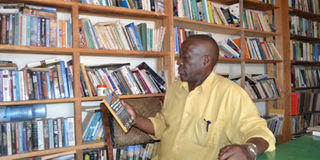End of chapter for Luweero’s library

Man in a library. You read by making the time (less time than you might imagine); by being disciplined; by setting priorities; by following a regular rhythm. PHOTO | FILE | NATION MEDIA GROUP
Luweero- Launched in 2010 to instill a reading culture among residents of Luweero, Maama Watali Public Library and Resource Centre with a wide range of reading materials has since remained idle forcing management to close business.
Mr Jackson Ddamba, the director at Maama Watali Public Library, says Friends of Luweero and the Rotary Club of Ottawa in Canada donated more than 100,000 reading materials after conducting a sensitisation programme for institutions of learning on how to benefit from the facility.
Mr Damaba says the donors also gave out text books to several schools in Luweero as part of their campaign, but despite all their efforts the poor reading culture among residents has rendered the facility redundant.
“It is a painful decision for both the donors and the managers of the library. For the last seven years the librarian says nobody has turned up to read the books,” Mr Ddamba told the Daily Monitor in an interview on Saturday.
“The facility has been opening five days in a week, but without clients to use the books. We have decided to have it closed,” Mr Ddamba announced.
He explained that neighbouring schools were more interested in books on the Ugandan syllabus and not the reference materials provided.
“We used to get teachers and students who asked us to bring them question banks from the Uganda National Examination Board including pamphlets which contain questions and answers for the different subjects offered at both Primary and Secondary schools. This was not our objective because we had reference materials. It is unfortunate that many of our children now read to pass exams. They want ready material for exams,” Mr Ddamba further claimed.
While the management of the library gave poor reading culture as the main reason for its closure, Mr Emmanuel Kabonge, a retired primary school head teacher and resident of Katikamu Sub-county, partly attributes the failure for the facility to attract clients on the advancement of the internet.
Mr Kabonge says students and many researchers no longer want to burden themselves with reading books and pamphlets since they can easily access online researched work on their phones and computers.
“Our children have not been helped by the schools they attend because many of these institutions have no good libraries. What they call libraries are just some few pamphlets in one corner of the school head teacher’s office,” Mr Kabonge says.
He adds that many of the schools which received books when the library had just opened shelved them while others kept them in boxes, claiming that they were not on the Ugandan syllabus and the general curriculum.
“We are now considering giving out these books to individuals interested in reading at a negotiable rate. We even stopped the donors from sending more reading material because the beneficiaries are not interested,” Mr Ddamba says.
Mr Issa Matovu, an education expert, says a country where citizens have poor reading culture is likely to register slow pace of transformation on all fronts.
In the entire Luweero District, Maama Watali has been the sole reference centre for both the adult and children.
The management of the library says that it would be useless to continue facilitating a librarian who has no clients.
Statistics
Available statistics show that there are currently 32 public libraries funded by the taxpayers across the country.
There are also 16 community libraries in different parts of the country.
A study released in 2011 by Electronic Information for Libraries revealed that 64 per cent of library users in Uganda are men while only 36 per cent are female.
Forty nine percent are aged between 21 and 30, and 75 per cent have completed secondary school and some post-secondary education or a degree.



